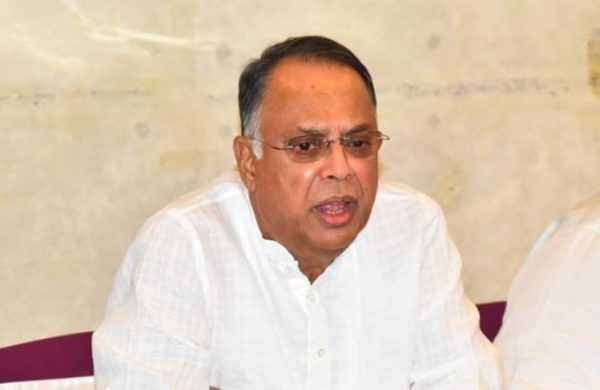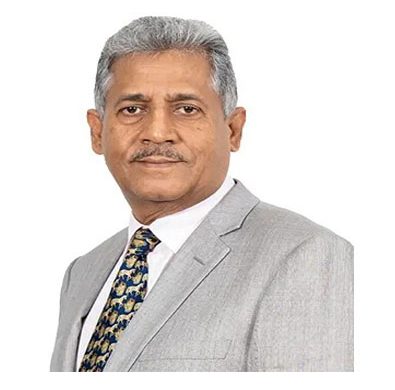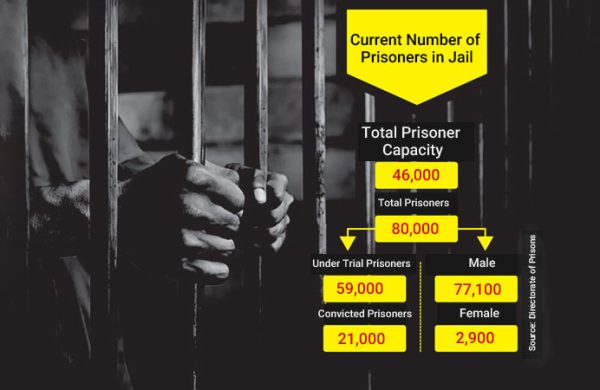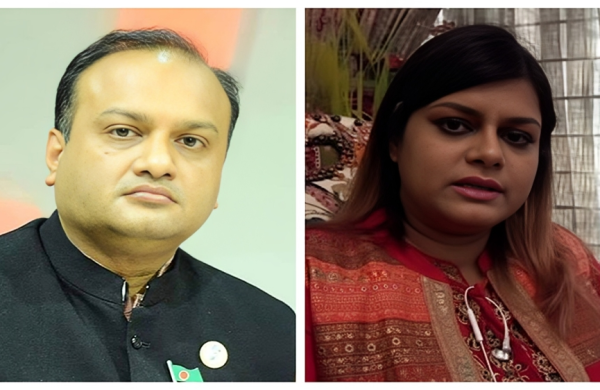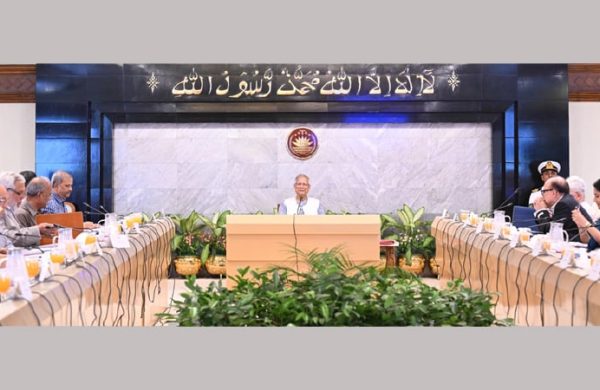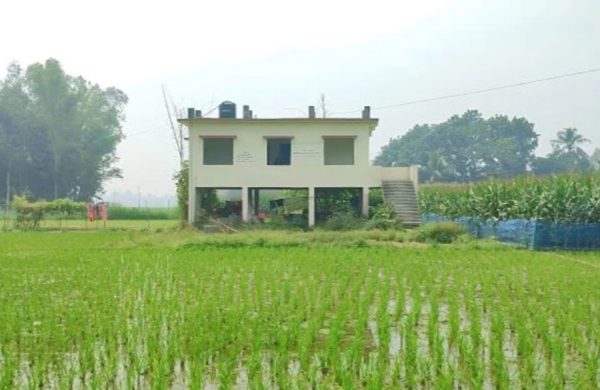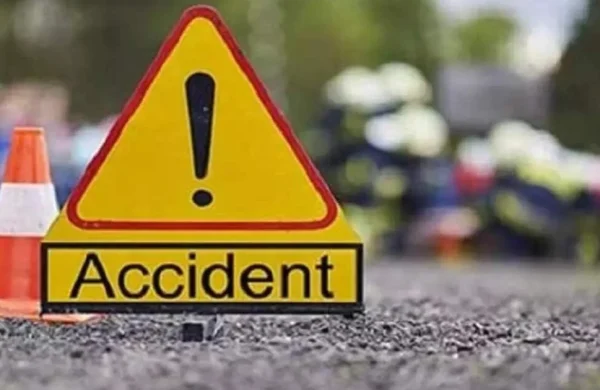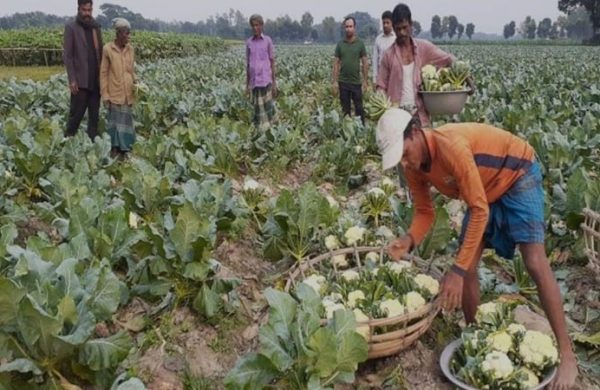Muhammad Yunus outlines vision for new Bangladesh
- Update Time : Sunday, October 6, 2024
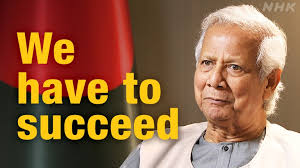
The interim government’s job is to carry out reform as quickly as possible, Younus says
TDS Desk:
Nobel Peace Prize-winning economist Muhammad Yunus has a new challenge: The political novice took the helm of an interim Bangladeshi government after a surge of student protests culminated in the ousting of former Prime Minister Sheikh Hasina. In an exclusive interview with NHK World’s Mitamura Taro in New York, Yunus shared his vision for his country’s future. This is the full transcript of the interview.
You’ve been in office for nearly two months. What kind of difficulties and challenges are you facing running Bangladesh so far?
Well, it’s not two months yet. It’s on the 8th of October, it will be two months. First, our main attention was to bring law and order, because we are coming in a revolutionary situation. It happened ― ultimate point was 5th of August, and we took oath on 8th of August. Our government came into being on 8th of August, still, the continuum of the uprising and the revolutionary activities in the country was going on.
So we wanted to tame it down, cool it down, so that normal life can start. People were eager that they settle down. So we were helping them to … businesses to start factories, to start productions and so on. So that was our main focus. And at the same time, we were planning what needs to be done immediately, how to build up discipline in our administration, get to know each other, get to know the programs that we want. So it was quite a busy and very worthwhile time.
Carrying on the will of the students
You’ve encouraged students to stay involved in the rebuilding of your country, and many of the student representatives are in the interim government. So what do you expect from these students?
The students were the ones who came up with this vision of a new Bangladesh while they are sacrificing their lives. Hundreds of young people, students, gave their lives during the revolution. They knew exactly what they wanted. Their imagination, their dreams were very elaborately told, explained. So when we formed the government, we thought there should not be any delinking between the government and the spirit of the young people.
So we invited two representatives from the movement to join the cabinet and with the full status of a minister. So they have joined, and they are holding responsibility of important ministries. That gives us an opportunity to discuss while we are formulating our policies. These are the people who came from the street, the demonstrations and the revolution. They carry that spirit, carry that vision. So we wanted to share that vision so that we don’t get disconnected from the entire movement that took place, entire revolution that took place.
We wanted to make sure, because a whole country mobilized themselves behind them, so they were leading, but everybody participated. So we thought their presence and their thoughts would be very important in policy making.
When will the election be held?
There’s a desire from the people, including the students, for a free, fair, transparent and inclusive election. Do you think it will be possible to hold an election within the next one and a half years?
We have not specified any time yet. We are simply given the task. The first task is to bring law and order, and this month we have announced six commissions to bring reforms. What kind of reforms that would be ― to elaborate that. So we have commissions sitting and doing intensive work to elaborate what actions needed to be taken in the coming months. So we gave them three months. We are hoping, by the end of this year, by December 31st, they can submit the reports of six commissions.
Then we have some documents elaborating what is the reform needed. But people have to agree with that. So we’ll go to intensive consultation among the political parties to see which one they like, which one they don’t like, which one they need to amend. So there will be consensus-building procedure for the next few months. See how quickly we can come to consensus, how much time it takes. Then we conclude that part. In the meantime, new commissions will be announced. They will also need time, so we’ll have the consultation period. And among them is most important ― each one is important ― but this one is relevant very much, this reform of the election commission.
Before you can hold the election, you should know what kind of election commission you have. But this election commission that we already have, kind of, they couldn’t hold a real election. So they showed either their own inability or some flaw in the way it has been constituted, the flaw in the way they were recruited to be election commissioner. So we wanted to change that. So we want to create a new electoral process, new electoral law, and new voter list, because this voter list is rigged voter list, so we don’t need that voter list. So that needs to be done, and the election commission report will come. According to their recommendation, we’ll reform the election commission and create a new election commission and create a new electoral process for the country.
So it might take a few years?
We don’t know how many ― but not a few years, maybe months to go, but our job is to do it as quickly as possible, because we are not here to stay long. Our task is to reform and hold an election. As soon as we are ready for that, we’ll hold the election.
The chief of the Bangladesh Army also said Bangladesh should return to electoral democracy within one-and-a-half years.
Many people have many views. Some want to get it done in 18 months and some want to do it in a longer period. Some want to do it in six months. So it’s a question of completing the process. We have to come up with the reform agenda and get a consensus building, and only then can hold the election.
Reform toward democratization
Over the past 15 years, the Hasina administration allowed corruption to run rampant throughout the country. How do you plan to root out that corruption?
One way ― we give it the top-most priority, because Bangladesh is in the deep ocean of corruption. So it’s not something that you can do something, repair it and it will disappear. It will not. It is in every single corner, every single step of the way you have corruption. So how to do that? We have been ― while I’m here, I’ve been discussing with the representatives from many countries who have experience on addressing the corruption issues. They have specialized in designing procedures to stop corruption. So we’re consulting and inviting them to help us to root out corruption forever, so that it doesn’t come back again. It’s not a temporary solution. It should be a permanent solution, but this is our number one priority. We want to do that. Otherwise, no matter what you do, will be completely meaningless, because corruption can twist everything around the corruption has the power to make changes without the verdict of the people
Under the former government, there was also a lot of money laundering.
A massive amount of money, massive amount of money was laundered away from Bangladesh.
So that’s another agenda. How to trace it ― follow the route and bring back the money. So we have been working through many channels, those who have been practicing this exercise, this procedure, how to track them, how to get the money back. So we are seeking their help to check the money that left Bangladesh as quickly as possible and start getting the money back again, because we had the money, now we are empty handed because of the massive way it was transferred to other countries.
Under the Hasina government, many people disappeared. Many are still missing. Their families are grieving. They want their fathers and husbands back. What will you do about this?
First, I have met them, discussed with them what their perception, what they want us to do, what are their frustrations in finding out whether their husbands, their sons, they’re alive, no trace of them, disappeared for many years. So that intensive discussion process continued throughout the government, and in the meantime, we have created a commission to investigate whatever is known, identify the places where they are taken, tortured, and some of them disappeared. So the locations, persons responsible, interview the people, interview the locations, people around the locations, to see if they remember anything. So the commission will continue to investigate that and come up with the report, show, identify what is already identified, and tell us what is not identified, not yet known, so that we can use other mechanisms to identify them.
And then we identify the people responsible for it. It’s not the entire army who was behind it. It’s a group of army officials who were utilized to make that happen, so how to take them down and punish them, bring to justice, so that nobody ever will dare to do it again. So this is the procedure we are following, and we hope very soon we’ll be able to identify bulk of it, not the 100% of it, but bulk of it. Then we’ll mark them. We’ll put them as a museums of horror that this country has done so much bad things to its own people by bringing it here.
These are the people who are imprisoned here in a single room for many years, five years, eight years, 10 years. Horrible story on how they are beaten up, how they finally disappeared, either they were killed or they have taken away some place that we don’t know. So this is what we have to investigate and come up with the clean information so that everybody feels relieved that finally we know what happens to our sons, what happened to our husbands, what happened to our brothers during this period.
During the protests, many students were injured or shot by police. Many are getting treatment at hospitals, and dealing with trauma. How are you going to support those students and also their families?
One thing we have done immediately, we have created a foundation so that we can put all the money to take care of all the families where the young people either sacrifice themselves or killed or they’re wounded. So all the people who have a case of either having a wounded person or someone who has been killed, this foundation will take responsibility of the life of the whole family so that they don’t have to miss in terms of financial resources, the contribution to be made could be made by the individual who died. So that was one thing very clear. We assured them that there’s no problem and we are raising funds. Government has given a bulk amount immediately, but we need a lot more funds, because it’s ongoing process. Every month we have to pay them to maintain themselves, so we’ll have fundraising internally, also internationally. We’ll make appeals. The foundation will continue to do that and come up with other ideas how to use the funds to generate more funds by keeping them in income-generating investments, so that it can generate money continuously, so the money doesn’t fall short of the necessity and so on. So this is on the financial side. We’ll continue to raise money, continue to assure people that they can carry on their life.
About the wounded ― there are many wounded people, nearly about 1,000 wounded people ― to see how they can be treated in Bangladesh. If Bangladesh treatment is not adequate, we are appealing to international community, governments, civil society, foundations, to help treatment in the countries where they can have good treatment, very specialized treatment. Each one is very complicated case that we saw, so we need very high level of technology and treatment to make sure that they have a meaningful life for them ahead of them. So this is what we are trying to do. Do the treatment inside and persons are responsible for groups of students in each hospital, they are spread out throughout the country. It’s not all concentrated in Dhaka. So everywhere, we have a specialized person who will monitoring their health condition, seeing how the treatment is done in this hospital, and at the same time, identifying whose treatment is not adequate within the country, and find location. I’m very happy that the international community is responding very positively to take them for treatment wherever it’s necessary.
Rebuilding the economy
What about the economy? I think many people in Bangladesh are now struggling due to severe economic conditions, including inflation and high unemployment. What economic policies is your interim government pursuing to support the people?
The previous government to fill up the shortfall in their finance, they printed up billions of dollars’ worth of money and released it in the market. It immediately fueled the inflation that we have in the country now, inflation has jumped up because of the releasing fresh money, paper money, so we stopped that process completely. We don’t want to continue with that process. [We] want to make sure that we generate enough income so that we can finance our own passage to the whole economy. At the same time, streamlining the way distribution of the food stuff and other essentials can be done so that intermediaries don’t grab money and corruption, charge them high corruption money to raise the prices of the goods. So that way, with both sides we’re trying to control inflation by taking under control the corruption along the supply chain, and also making sure that government doesn’t print any more money.
You’re planning to publish a white paper. But it’s a difficult task. What is your schedule and what will be on the agenda?
The same agenda, like the other commissions. We’re expecting the report by the end of the year, so that we have all these reports. The white paper is kind of documenting the condition of the economy, where the massive gap has arisen, where administration completely failed, institutions completely failed, policies completely failed. What is our situation on day one? So that we have very clear documentation of that. Then recommend actions ― what actions to be taken? So coordinated action for the whole economy. So that’s a part after we get the report, we have that finalization of our policies and institutional changes and so on.
In the meantime, we are taking actions as the problems arise, like in the banking system. We put someone – experienced banker, experienced economist ― to be head of the central bank. So the central banking system comes to an order. It was totally mess. The whole banking system. There is no policy. There was no orderly fashion of doing business every day. So we want to bring order to that and our foreign exchange is up, came down to the bottom. So we want to build up the foreign exchange.
And we are reaching out to international organizations ― World Bank, IMF, Asian Development Bank ― to see how to finance the liquidity gap, so that we don’t fall short of paying our dues, so that everybody is happy with that. They can supply more. Because we need lots of petroleum products, gas, oil to run our power plants and everything. So this one, we want to make sure that they continue and they will continue because they get paid. Otherwise they will not pay us. They will not supply us. So we want to make sure that continues smoothly and so on. So while we are trying to address the fundamental issues, at the same time, we have to do the day to day business running without any interruption.
Luckily, our foreign exchange situation is improving, because remittance flow has picked up once the government came into the place, there’s a kind of a trust has been generated among the people who send the remittances from abroad through the proper channel. Then we get the foreign exchange in our hand. And luckily, past two months, we see significant rise in the foreign exchange, coming to remittance.
What is your roadmap for the transition to democracy? You noted that the former government destroyed the country’s political, financial and other institutions, so how will you proceed?
Yeah, this is one discussing that our roadmap is reforming the institutions, set the policies in practice, so that we can bring order in the financial and business sector and make the life of the people tolerable. The inflation doesn’t make them, impossible to have a daily life they want to lead. So that’s one thing we want to assure. So these are simultaneous thing. We cannot wait for the report to come, take action while we know precisely what is happening. We take, start taking action, reporting back to the commission. This is action we have taken, and they may have a different view. They can say, no, no, don’t take this action yet. Wait for a few weeks so that we can give you a better suggestion how to do that.
So we work with the commission. It’s not a kind of locked commission that we cannot see what’s happening inside the commission until the report comes out. It’s a very interactive commission. They tell us what they are thinking. It’s not a final version of it, but they can continue. So we can learn from their experience and practice it as we go along, and then they view it and see what will be the final verdict for them, what will be the final recommendation for them.
Political novice
Professor Yunus, you are a prominent economist and a Nobel Peace laureate, but you are not a politician. And yet you have to lead this country. Since you don’t have a political background, won’t that be a challenge for you?
It’s advantage and also disadvantage. Since I’m not a politician, I’m not biased towards one kind of thing that the political party has been preaching and so on. They have to stick to their political agenda. I’m a free person, and all of us within the cabinet are free persons. We can do what we feel is right in the political view. Some they will view is right. Some they will say, Oh, this is not right. You should have done that. But we see what is to be done on this. And we have very clear agenda. We want to make sure economy functions, we make sure our system functions, we make sure that our institutions functions. Nobody will debate about corruption. That’s not a political thing. This is a necessary thing like breathing. Breathing doesn’t have any political agenda. You breathe because you have to live. So same as you have to function economically without corruption. Corruption pushes you in a disadvantageous position. So you are not in a disadvantageous position and so on.
So as I said, it’s an advantage, it’s a disadvantage. Politicians have advantage. They have followers in support of that. We are neutral. We go by the rules. We don’t go by the policies. And I hope people like it. And they want results, rather than political agenda right now, politicians are promoting their political agenda. We have nothing to do with that. Each political party has their own agenda, own vision, own philosophy. We do it in a more pragmatic fashion, what we need to do.
Help from Japan and the rest of the world
Japan is the largest donor in terms of official development assistance for Bangladesh. What do you expect from Japan?
Well, it was a wonderful friend. Japan has always been a wonderful friend throughout our history. So we as a good friend, we go back to Japan for their help and help in all the sectors that I’ve been talking about – how to bring corruption to disappear. Whatever help you can give, it will be an enormous help to us, because this is a key to the whole future of Bangladesh, that this is the time that we can really address the corruption issue. It’s very difficult for other time, but for us, it’s much easier to address it because we don’t have any followers to satisfy. We can do it because we think it’s necessary. We think it’s important to do that. So Japan can help us on that.
Japan can help, of course, on the economic front, helping us to go through this rough patches that we are going through. Our liquidity crisis that we have right now. Japan can help us go through the liquidity crisis. And we are appealing to other institutions, financial institutions, to help us too, but Japan as a very tested friend, very close friend, we look forward to get support during this very critical period.
What about the US? There’s been a significant improvement in your country’s ties with the US since you became chief advisor, and you have met US President Joe Biden in New York. So what kind of support are you trying to get from the US?
Like we tell other friends, what is our need. We give the whole list of our need, corruption, financial support and institutional support, all the list of support that we are looking for. We did it to Japan. We are doing it to USA. We are doing the European Union. We are doing everybody who can help us, we share with us. Some will do this one better. Some can do this one better. So we are hoping that we can coordinate and make this all come together, because time is important factor. If the support is committed, but it comes two years later, we don’t have any impact in our building up the speed in the system, so we need it now. Urgency is focus, is in focus, that whatever help you can give, please give us right now, because right now, help right now will really go long mileage, but if it comes two years, one year later, its impact will be much less, because in the meantime situation got worse. So this is the right time to do that. So this is one we explained to the United States.
I’m very happy. We get a very good response. We get good response from the World Bank. We got a very good response from IMF. We got a very good response from the Asian Development Bank, where Japan is very much involved in that. So we are bringing everybody in the same picture, so that they can see who is doing what and what needs to be done now.
Once the honeymoon period ends, I think you will face more challenges…
Sure, that’s the way it goes, that they’ll be gradually, people will get frustrated because their ambition, their imagination is sky high now, so they are hoping that things will happen right away. When it’s not happening right away, it will take months, they will be disappointed. They will start criticizing the inefficiency of the government and so on. But this is the way it goes. It’s nothing new, and we’ll try to explain why it’s taking time. And in the meantime, if some concrete results are given, even a small sample of it, people say it’s happening, let’s wait. Our price is coming down a little bit, not much, but it’s coming down. It’s not rising as used to be rising in the back.
So this is how we are hoping that we have to show results immediately. It’s very important, and so that people have some capacity to restrain themselves in being upset about the situation. So we should take people with us, keep them happy that their results are produced. Ultimate destination has not been reached, but we’re making progress.
So you are going to lead this country as a chief advisor or caretaker government toward the elected government.
That’s right. That’s a task we are given. That’s how we understand when we are invited to form the government. This will continue until the election is held. Our job is to hand over the country, hand over the government to the elected government.
But we don’t know how long it will take?
It will not, should not take long, too long. Because, again, too long will be kind of make people totally impatient. That will not be convenient thing for any government to make people absolutely impatient. So we have to work as long as the patience take them. So we have to be careful.
The students have potential. They are really good at IT, and they also have many new ideas. So the students led the protest, but for the interim government, what do you expect from them?
It’s an interaction again, student, what their dream is, how we are doing it, where we’re doing it right, where we’re not doing it right, a continuous process of exchange of ideas and so on, like we do it for the rest of the country. So students are not the only component of the society. They are leading component of the society, but there are broader society back there. So we continue to dialog with them, continue to interact with them, continue to interact with the political parties, all political parties, so they know what you’re doing. Some will be unhappy. Some will be moderately happy. Some will be totally unhappy. So this is a whole mixture of things, so we have to know precisely how far we can go. Then after that, we become ineffective. Then this will be failure of the government.
Failure is not something that we can accept, because this government has to succeed, and if it doesn’t succeed, there’s no meaning to having this government at all.
I think there will be a lot of resistance from vested interests.
A lot of opposition ― definitely. That’s a part of the game. There will be opposition. There will be parties who are defeated, who ran away from the country. They will try to get back, start taking space in the political spectrum and work against your existence. So that has to be same time, people will recognize them, that this is not the right thing. They cannot do that. So the people have to resist them. If people are not with us, they will not resist. They say, Okay, you are the same guys. So what’s so good about you? So today, you are good. Tomorrow, you cannot, cannot appear as a good because you have not delivered.
One last question about Japan. So once again, what do you expect from Japan?
Friendship … all the things that we are saying, this is a crisis period. At the same time, this is a great opportunity, because a lot of enthusiasm, lot of unity among the people, very unheard of unity that Bangladesh has right now, because Bangladesh was also political parties divided themselves into little groups here, little groups there. Here, we have very unified thing and political parties supporting us. Well, we have this power of unified commitment.
This is a good time to have Japan with us and speed up the process before mood changes among the political parties, among the common citizens. They become suspicious that maybe target will not be reached, maybe objective will not be fulfilled. So we don’t want to get to that. We want to make sure people remain confident of the success of our efforts.
Source: NHK/Japan Broadcasting Corporation


